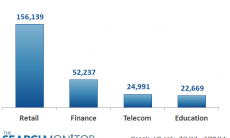If, in our wired world, it feels like something useful is always imperiled by something from the dark side, well, it’s not just a feeling. Viruses have infected our personal computers. Adware and spyware are served as garnishes with our Internet connections. Spam has overtaken useful e-mail. Phishing tries to steal our very identities. Is click fraud the dark side of the paid search golden goose?
Welcome to the second Biznology Newsletter. I come to you each month with a topic at the center of business and technology—this month we’ll look at a possibly unstoppable force that imperils search marketing: click fraud.
How can the search engines respond?
The paid search engines are deadly serious in combatting click fraud, because it imperils the entire paid search business. All paid search vendors have click fraud police that do nothing but investigate click fraud, rebating any suspicious fees. Search engines also use technology to spot odd behavior patterns that provide telltale clues.
Google has responded with Smart Pricing, which they say rebates some of the per-click fees for lower-converting keywords. This is a step in the right direction, but hardly a panacea. (Why is it that nothing is ever a panacea? I am not sure why we need that word in the dictionary.) If the click fraud army can truly randomize its selection of victims, then Google can’t detect that any of them require rebates—a creeping invisible tax begins to be extracted on all paid search.
Just as with spam, phishing, and other Internet evils, a game of cat and mouse is underway. The good guys continually upgrade their efforts to catch the bad guys, who then move on to a new technique. The latest cure for click fraud (and maybe spam and phishing too) is a method of fingerprinting computers that can identify whether multiple clicks (or spam or phishing attempts) come from the same physical computer. It’s possible that advances like these will keep click fraud under control, but I think the model itself must change to truly solve the problem of click fraud.
The flaw in the pay-per-click model is that the advertiser makes no money on a click. It’s the same flaw that brought on the dot-bomb era when everyone realized that you can’t pay for eyeballs because you can’t take eyeballs to the bank. You can’t take clicks to the bank, either.
There is only one way out for paid search, which is to pay on conversion, sometimes called pay-per-action (PPA), where advertisers pay only when they sell something. There is no way for the paid search scammers to scam a conversion—if they have to buy it then they have to pay. But search engines won’t like that system at all, because they can’t directly measure the conversion. They’d have to trust the advertisers to tell them when it happens, putting them on no more solid ground than affiliate marketers. Search engines would have to shift from checking whether click fraud artists are scamming their customers to a system where they check whether their customers are scamming them (because customers could make the sale and claim no sale).
So what’s the answer? There may not be one anytime soon. So far, despite rampant reports of click fraud, paid search advertisers are not abandoning the medium. If they do (and if click fraud continues to increase, it is inevitable that they do), search engines will be forced to respond. But search engines have little interest in changing their business model to cost per action before then. The smaller players may move first, to differentiate themselves. Snap.com introduced just such a PPA model in October, and they may be emulated by others.
Search engines may offer a system of pay-per-action, where advertisers pay only for conversions, but may allow that pricing model only if the advertiser agrees to use the search engine’s tracking software and agrees to having their site audited. That way the search engine can offer pay-per-action to advertisers who want that while retaining the pay-per-click model for those that find these terms too intrusive. Along those lines, Google purchased Urchin, a Web metrics vendor that could allow Google to offer that kind of approach. Perhaps Google will allow PPA pricing for sites that use its Urchin analytics (so Google can audit your sales from Google searches).
No one knows for sure how this morality play will end up, but it’s clear that something will have to give if click fraud continues to rise. There is actually more incentive to commit click fraud then to create viruses or spam, so unless someone invents a detection technique that stays ahead of the defrauders, the model is what will have to change. Insanely complex algorithms for detecting fraud are used in other industries, so maybe the click fraud police can stay ahead of the perpetrators, but I am not sure.
So what’s a poor search marketer to do?
OK, so click fraud is running rampant and will only get worse. The sky is falling! Well, not quite.
Click fraud is a problem for search marketers, but if you are profitably using paid search techniques today, there is no reason to stop, or even to slow down. Yes, you are paying more because of click fraud artists, but you pay more for clothes because of shoplifters. You pay more for your credit card because of identity theft. Your insurance rates are higher due to scam artists. Click fraud is no different than any of these parasitic activities—it imposes a tax on an economic activity but as long as the parasites are kept in check, they don’t kill the golden goose.
Search marketers are not completely helpless, either. Take steps today to reduce your exposure to click fraud:
- Stick to the larger players. The top paid search vendors, especially Google and Overture, tend to have the most resources to spend to combat click fraud. They are also more likely to have syndicators that steer clear of bad behavior. Perhaps the percentage of click fraud is lower with the big players due to these factors.
- Check your records. Your Web server traffic logs shouldn’t agree with vendors reports—if they do, it means that you haven’t gotten any fraudulent clicks (according to your vendors). In addition, you should check your variations from month to month. If your paid clicks for a particular keyword or from a certain search engine increase markedly with little corresponding increase in conversions, call it to the search engine’s attention. You may get them to rebate some of your costs.
- Hire a private detective. Companies are springing up to aid search marketers to catch the crooks, such as PPC Audit. At the same time, Web metrics vendors are scrambling to add click fraud detection features to their existing tracking tools, such as Coremetrics and the aforementioned Urchin Perhaps Google intends to offer some click fraud protection using Urchin.







